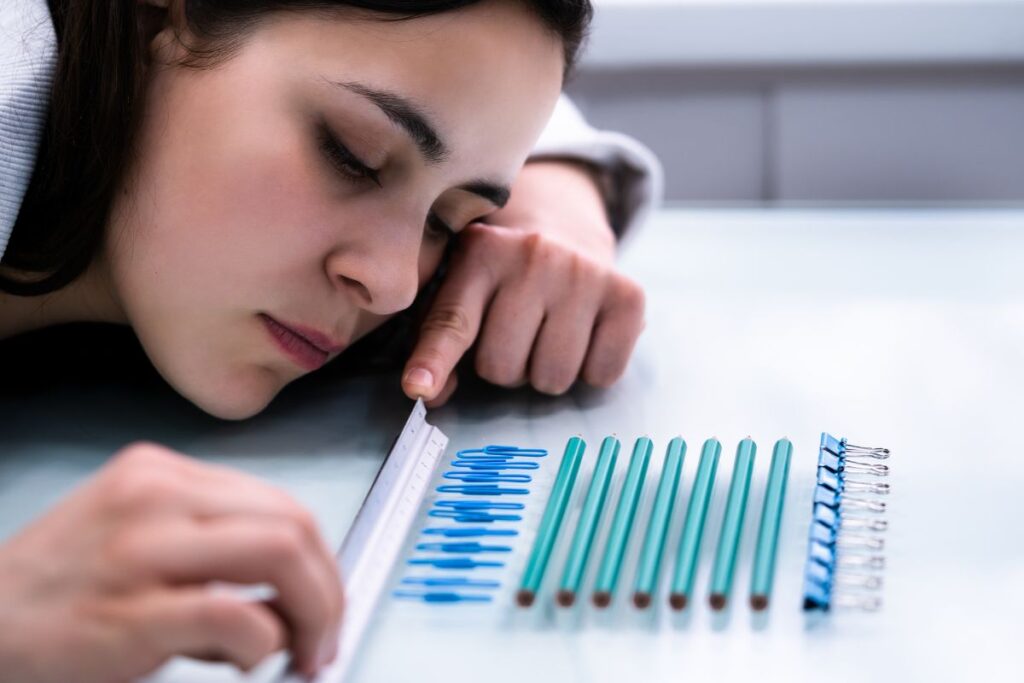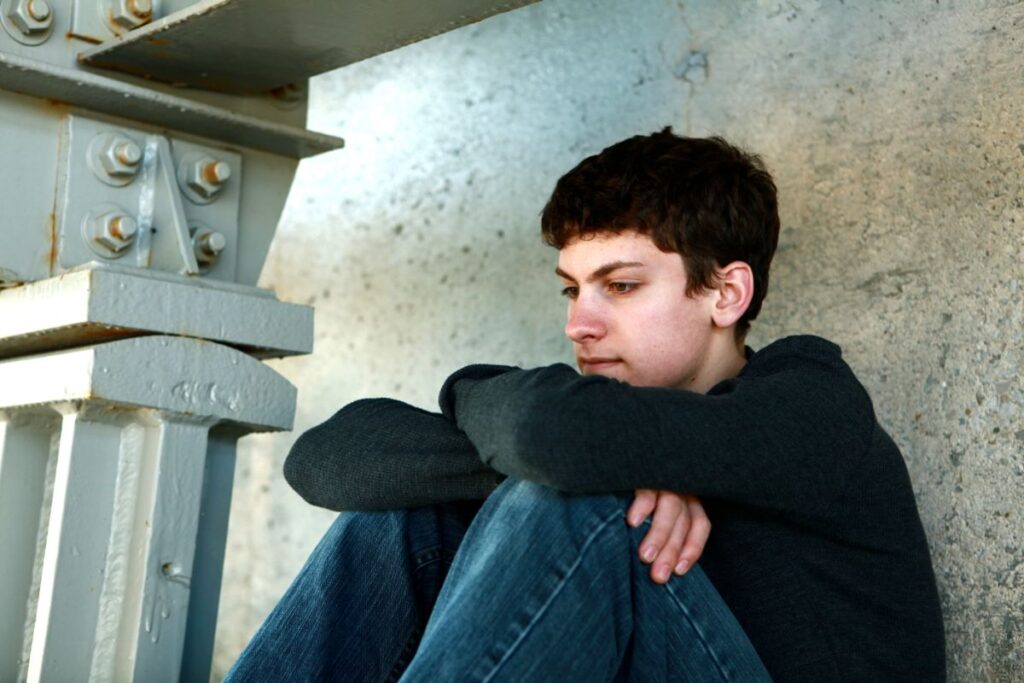Teen OCD Treatment Centers
OCD Test for Teens
Take the first step—start our quick OCD screening for teens today.
Contact Hillcrest Adolescent Treatment Center today to learn more.
Teen OCD Treatment Centers
Take the first step—start our quick OCD screening for teens today.
Contact Hillcrest Adolescent Treatment Center today to learn more.

If your teen is struggling with obsessive thoughts or repetitive behaviors they can’t control, you’re not alone—and neither are they. Obsessive-Compulsive Disorder (OCD) affects thousands of adolescents across the country, often creating distress, shame, and disruption during an already difficult stage of life. Recognizing the signs of OCD early can lead to more effective treatment and lasting relief.
That’s why we created this page: to help families better understand OCD in teens, to offer tools for early screening, and to provide a compassionate path toward healing.
Take our free OCD Test for Teens to better understand whether your child may be showing signs of obsessive-compulsive tendencies—and learn what next steps to take. While no online test can provide a formal diagnosis, it can help you determine whether it’s time to seek support from a mental health professional.
OCD Test for Teens
Understanding OCD in Teens
Obsessive-Compulsive Disorder is a mental health condition characterized by a cycle of unwanted thoughts (obsessions) and repetitive behaviors (compulsions) performed in an attempt to ease the anxiety those thoughts bring. While OCD is often portrayed in the media as a desire for neatness or organization, it is far more complex—and often far more painful, especially for teens.
For adolescents, OCD may present in ways that are difficult to spot at first. Many teens are reluctant to talk about their intrusive thoughts due to fear, embarrassment, or shame. Some may not even realize their thoughts and behaviors are part of a disorder. That’s why early education, compassionate screening, and timely treatment are so important.
Common themes in teen OCD include fears of contamination, harm coming to others, religious guilt, sexual thoughts, and perfectionism. These fears can manifest in compulsions like excessive handwashing, repetitive checking, or mental rituals such as silent counting or repeating prayers. The underlying cause is not a lack of willpower, but a disorder that requires compassionate, evidence-based treatment.
Signs and Symptoms of OCD in Teens
Obsessive-Compulsive Disorder doesn’t always present the way people expect. For some teens, it might involve visible rituals like excessive cleaning or organizing. For others, it’s a private battle—one filled with distressing thoughts and invisible compulsions no one else can see. Because OCD manifests differently for every adolescent, it’s important to understand the full range of symptoms so you can recognize when something deeper might be going on.
Obsessions
Obsessions are persistent, unwanted thoughts, images, or urges that cause intense anxiety. These are not just typical worries—they feel intrusive, overwhelming, and impossible to ignore. Many teens with OCD recognize their obsessions as irrational, but feel powerless to stop them.
Some common obsessive themes in adolescents include:
- Contamination fears: A fixation on germs, dirt, or illness, often accompanied by a need to feel “clean” or sanitized at all times.
- Harm fears: A deep fear that they might unintentionally harm someone else or themselves, even if they’ve never acted aggressively.
- Perfectionism and control: An obsession with things being symmetrical, “just right,” or free from mistakes. This might involve excessive redoing of schoolwork or rearranging items until they “feel okay.”
- Intrusive thoughts: Disturbing thoughts about violence, sex, or religion that feel completely out of character. Teens with OCD often feel ashamed of these thoughts, even though they don’t want to act on them.
These obsessions can be exhausting and all-consuming. A teen might spend hours trapped in their head trying to suppress or make sense of these intrusive ideas, leading to emotional fatigue and withdrawal from daily life.
Compulsions
Compulsions are the repetitive actions or mental rituals that teens perform in an attempt to neutralize their obsessions or relieve the anxiety they create. These behaviors may seem irrational or unrelated to the original fear, but they feel urgent and necessary in the moment.
Examples of common compulsions include:
- Excessive cleaning or grooming: Washing hands until they’re raw, showering for long periods, or avoiding anything perceived as “dirty.”
- Checking behaviors: Repeatedly checking to make sure doors are locked, appliances are off, or homework is perfect—even when they know it already is.
- Mental compulsions: Silently counting, praying, or repeating phrases to ward off perceived danger. These rituals are often hidden and mistaken for daydreaming or zoning out.
- Avoidance behaviors: Refusing to go certain places or interact with certain people for fear of contamination, harm, or triggering an obsession.
Over time, compulsions can become incredibly disruptive. A teen may spend hours each day performing rituals, be late to school, or struggle to complete simple tasks. The relief these rituals provide is short-lived, reinforcing the cycle and making it harder to stop.
Emotional Symptoms
While obsessions and compulsions are the hallmarks of OCD, the emotional toll is just as significant. Teens with OCD often experience a range of mental health symptoms tied to the distress of their condition.
Emotional symptoms may include:
- Anxiety and guilt: Teens may feel constant dread or worry, especially if they believe their thoughts say something bad about them. They often internalize blame and may describe themselves as “broken” or “bad.”
- Irritability or frustration: When rituals are interrupted or their thoughts become overwhelming, teens may lash out, shut down, or become defensive. They may struggle to explain their feelings or actions to others.
- Sadness or hopelessness: Feeling stuck in a loop of compulsions and shame can lead to depressive symptoms. Some teens begin to lose interest in activities they once loved or withdraw socially.
- Trouble sleeping or concentrating: Obsessive thoughts can interfere with a teen’s ability to fall asleep or stay focused in class. They may seem distracted, distant, or mentally exhausted.
Many teens with OCD suffer in silence. They may not understand what’s happening, or they may fear judgment if they speak up. That’s why early recognition and compassionate support are so critical.
If your teen is showing any combination of these signs—especially if they’re interfering with daily life, relationships, or emotional well-being—it may be time to explore further. Encourage them to take our [OCD Test for Teens], and consider reaching out to a licensed mental health provider who specializes in adolescent OCD. Early intervention can pave the way for lasting healing and relief.
How Does OCD Impact a Teen’s Quality of Life?
OCD doesn’t just affect how a teen thinks, it impacts how they live. Left untreated, obsessive-compulsive symptoms can interfere with every part of a teen’s daily routine, from school performance to social relationships to self-esteem.
Teens with OCD may:
- Struggle academically due to time-consuming rituals or inability to concentrate
- Withdraw from friends or activities out of embarrassment or fear of triggering their symptoms
- Experience sleep issues or eating challenges
- Engage in self-blame or harsh self-criticism
- Feel isolated, misunderstood, or different from their peers
The constant loop of intrusive thoughts and rituals can be exhausting. Many teens describe feeling “trapped” inside their own minds. But with the right support, it’s possible to break free. Early intervention is key.
Treatment Programs in California for Teens With OCD
Hillcrest Adolescent Treatment Center offers several levels of care for teens struggling with OCD and other mental health conditions. Located in the tranquil hills of Agoura, California, our facility provides a private, serene environment where adolescents can stabilize, reflect, and heal. Each level of care includes evidence-based approaches like Cognitive Behavioral Therapy (CBT), Exposure and Response Prevention (ERP), psychiatric medication management, and holistic modalities designed to support teens on every level—emotionally, mentally, and physically.
Residential Treatment
A highly structured, 24/7 program ideal for teens with moderate to severe OCD symptoms. Residential treatment allows teens to focus solely on their healing while receiving daily therapy, psychiatric care, and peer support.
Partial Hospitalization Program (PHP)
For teens who are transitioning from residential care or who need more structure than outpatient services provide, our PHP offers full-day programming five days a week, with clinical and psychiatric services included.
Intensive Outpatient Program (IOP)
This flexible program takes place during the summer months, and offers support several days per week while allowing teens to continue attending school or other responsibilities. IOP is an excellent option for teens who need continued care after residential treatment or who are experiencing early signs of OCD.
Treatment Programs in California for Teens With OCD
Hillcrest Adolescent Treatment Center offers several levels of care for teens struggling with OCD and other mental health conditions. Located in the tranquil hills of Agoura, California, our facility provides a private, serene environment where adolescents can stabilize, reflect, and heal. Each level of care includes evidence-based approaches like Cognitive Behavioral Therapy (CBT), Exposure and Response Prevention (ERP), psychiatric medication management, and holistic modalities designed to support teens on every level—emotionally, mentally, and physically.
Residential Treatment
A highly structured, 24/7 program ideal for teens with moderate to severe OCD symptoms. Residential treatment allows teens to focus solely on their healing while receiving daily therapy, psychiatric care, and peer support.
Partial Hospitalization Program (PHP)
For teens who are transitioning from residential care or who need more structure than outpatient services provide, our PHP offers full-day programming five days a week, with clinical and psychiatric services included.
Intensive Outpatient Program (IOP)
This flexible program takes place during the summer months, and offers support several days per week while allowing teens to continue attending school or other responsibilities. IOP is an excellent option for teens who need continued care after residential treatment or who are experiencing early signs of OCD.

How To Help Your Teen With OCD
If your teen is showing signs of OCD, it’s normal to feel unsure of how to help. You might worry that acknowledging their rituals will make things worse, or feel frustrated by behaviors you don’t understand. But your presence, patience, and proactive support can make a world of difference.
Here are a few ways to help:
- Educate yourself. Learn about OCD and how it works. Understanding the difference between normal teen behavior and clinical OCD can help you respond with more compassion and clarity.
- Validate their experience. Let your teen know you believe them and that they’re not alone. Avoid dismissing their fears, even if they seem irrational.
- Encourage professional support. A clinical diagnosis and treatment plan are the most effective ways to address OCD. Taking our [OCD Test for Teens] can be the first step.
- Avoid enabling rituals. While it may feel helpful to accommodate compulsions (like checking things for them), doing so may reinforce the disorder. Work with a therapist to learn supportive boundaries.
- Be patient. Recovery isn’t linear. Your teen may have ups and downs, and their healing may take time. What matters most is that they feel seen, heard, and supported along the way.
How To Help Your Teen With OCD
If your teen is showing signs of OCD, it’s normal to feel unsure of how to help. You might worry that acknowledging their rituals will make things worse, or feel frustrated by behaviors you don’t understand. But your presence, patience, and proactive support can make a world of difference.
Here are a few ways to help:
- Educate yourself. Learn about OCD and how it works. Understanding the difference between normal teen behavior and clinical OCD can help you respond with more compassion and clarity.
- Validate their experience. Let your teen know you believe them and that they’re not alone. Avoid dismissing their fears, even if they seem irrational.
- Encourage professional support. A clinical diagnosis and treatment plan are the most effective ways to address OCD. Taking our [OCD Test for Teens] can be the first step.
- Avoid enabling rituals. While it may feel helpful to accommodate compulsions (like checking things for them), doing so may reinforce the disorder. Work with a therapist to learn supportive boundaries.
- Be patient. Recovery isn’t linear. Your teen may have ups and downs, and their healing may take time. What matters most is that they feel seen, heard, and supported along the way.

Treatment at Hillcrest for Your Teen
At Hillcrest Adolescent Treatment Center, we offer individualized, trauma-informed care for teens with OCD. Our multidisciplinary team includes licensed therapists, psychiatrists, and support staff who specialize in adolescent mental health. We treat every teen with the dignity, compassion, and clinical expertise they deserve.
Our approach is rooted in:
- Evidence-Based Therapy such as CBT and ERP
- Family Involvement, with regular family therapy and education
- Holistic Healing through art therapy, movement, mindfulness, and nutrition
- Safe and Supportive Environment where teens feel seen and empowered
Most importantly, we meet your teen where they are, not where we expect them to be. Whether they’re just beginning to show signs of OCD or have struggled for years, we’re here to walk alongside them.
Begin Healing From OCD Today
You don’t have to navigate this alone. If you suspect your teen may be struggling with obsessive-compulsive thoughts or behaviors, we encourage you to take our free OCD Test for Teens. The results may help you decide whether it’s time to seek professional support—and if it is, we’ll be here.
Hillcrest Adolescent Treatment Center is committed to helping teens with OCD rediscover peace, clarity, and connection. Contact us today to learn more about our programs, verify insurance, or schedule an assessment.




















